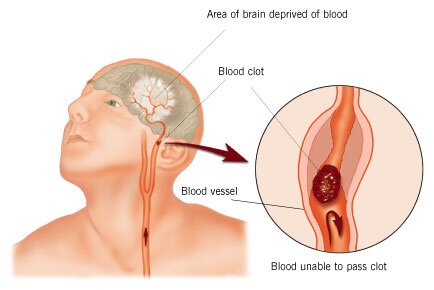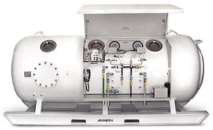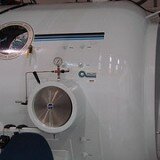Cerebral Hypoxia (Brain Hypoxia)

Cerebral Hypoxia (Brain Hypoxia) develops when our brain receives less oxygen than required to sustain its metabolic requirements.
Among all cells in our body, the brain cells are most sensitive to the oxygen deprivation.
Five minutes without oxygen is enough for the brain cell to start dying. Cerebral Hypoxia that lasts for that or longer time can cause seizures, coma or even brain death.
Diminished oxygen supply to the brain may produce significant cognitive, physical and emotional impairments.
As a result, a hypoxic injury can have a profound impact, in terms of functional deficits, cost involved in treatment and the disruption it can have on people’s lives and that of their families.
Representing only 2-3% of an adult’s body mass, the brain receives 20% of the cardiac output and accounts for about one fourth of overall resting oxygen consumption. The brain is one of the most oxygen-sensitive organs of the body, and it is not surprising that neurologic dysfunction is a prominent manifestation of hypoxia. Neuropsychiatric manifestations of chronic hypoxia can be a major source of morbidity in patients with COPD.260
Cerebral vascular resistance is prominently affected by acute hypoxia and increases when PaO2 falls below 50-60 mm Hg. However, with continued hypoxia, adaptation occurs, and overall cerebral blood flow in hypoxemic patients with COPD is normal. The brain is very sensitive to changes in perfusion, and effects of hypoxia on the brain are more likely to be due to decreased perfusion than to hypoxemia.260
Cerebral Hypoxia Symptoms And Causes
Extremely acute cases of brain hypoxia result in a state of complete unawareness and unresponsiveness with abolition of the brain stem reflexes including pupilary response to light and breathing reflex.
Among conditions that can lead to cerebral hypoxia (brain hypoxia) are: stroke, heart attack, hypotension, birth injury, aortic valve deficiency, compression of the trachea, general anesthesia, and other diseases which paralyze respiratory muscles.

Inadequate blood supply to the brain is a major cause of Ischemic hypoxia (stagnant hypoxia). Oxygen deficiency may not always be evident and obvious; therefore people should be aware of symptoms of hypoxia and take immediate corrective measures, especially patients who are at risk of developing oxygen deficiency.
Understanding the underlying cause of the hypoxia determines the hypoxia treatment which in emergency situations includes life-support measures like mechanical ventilation, blood infusions, medications to support heart rate blood pressure.
No need to mention that awareness of hypoxia symptoms is crucial, especially in cases of brain hypoxia / ischemic hypoxia, because it is a medical emergency and every moment is critical to a meaningful survival.
Complications After Severe Cases Of Brain Hypoxia
Complications after severe cases of brain hypoxia may include a prolonged vegetative state, e.g. basic life functions such as breathing, blood pressure, sleep and wake cycle. Eye opening may be preserved, but the patient is not alert and does not respond to surroundings. Some patients suffering severe cases of cerebral hypoxia may survive about a year, some may survive longer. Time of survival partly depends on how much care is taken to prevent a complex of other problems. Major complications may include:
- Infections, e.g. Pneumonia
- Vein Thrombosis
- Bed Sores
- Improper Nutrition
Hyperbaric oxygen (HBO2) significantly increases the oxygen diffusion driving force, thus increasing oxygen availability to tissues. This helps to correct negative effects of hypoxia and restore normal tissue oxygenation.
If you prefer to learn more about Brain Hypoxia (Cerebral Hypoxia) by reading a textbook, we recommend a selection of books here... Providing a detail overview of Cerebral / Brain Hypoxia, the recommended books selection presents the latest research in this field from around the world.

Further Reading...
-
-
-
- Hyperbaric Oxygen Treatment : The Last Frontier. Philip B James MB ChB, PhD, DIH, FFOM
- Treatment of Diabetic Ulcer Wounds By Hyperbaric Oxygenation. Review Of Scientific Trials Concerning Diabetic Foot Ulcers
- Retinopathy of prematurity may be prevented by the intermittent use of higher dosages of oxygen.
- Hyperbaric Oxygen Treatment (HBOT): oxygen transport to ischemic / hypoxic tissues is explained in this article by analyzing the physics and physiology of oxygen.
- Why Hyperbaric Oxygen Therapy is the most natural way of letting the body to heal itself...
- Aerobic Cellular Respiration Overview...
- TRCS - Transportable Recompression Chamber System For Emergency Evacuation And Treatment.
- Acute Brain and Cardio-Respiratory Dysfunction After Blast/Blunt Injuries: The Life-Preserving Effects of Hyperbaric Oxygenation...
- Diseases of the Respiratory System.
- Oxygen Toxicity Overview
- Characteristics for Autism Spectrum Disorders and diagnostic criteria.
- Near Drowning Overview.
- HBOT: historical perspective and physical basis...
- Hypoxia is sometimes dangerous, life-threatening state for our cells and tissues. Learn about hypoxia symptoms, causes and types...
- SPECT - Single Photon Emission Computed Tomography Emission Computed Tomography, a type of nuclear imaging showing how blood flows to tissues of organs.
- Air Embolism, the definitive treatment of which remains Hyperbaric Oxygen Therapy (HBOT).
- Carbon Monoxide Poisoning, recovery among patients treated with Hyperbaric Oxygen appears to be improved beyond that expected with ambient pressure supplemental oxygen therapy...
- Cyanide poisoning in combination with carbon monoxide poisoning frequently occur simultaneously in victims of fires, smoke inhalation, military operations and industrial accidents.
- For Gas Gangrene (Clostridial Myonecrosis) and Clostridial Myositis or spreading clostridial cellulitis with systemic toxicity the preferred treatment is a combination of Hyperbaric Oxygen Therapy (HBOT), Surgery, and Antibiotics.
- Crush injury is directly associated with trauma while skeletal muscle compartment syndromes arise from ischemia, venous outflow obstruction, exertion, external compression as well as trauma.
- Hyperbaric Oxygen Treatment Center At Elisha & Rambam Hospitals
- With Compartment Syndrome, Hyperbaric Oxygen Therapy (HBOT) when used as an adjunct to a surgery and antibiotics shows promise as a way to decrease complications and morbidity.
- Decompression Sickness - definition, symptoms and treatment of choice...
- Non healing wounds like diabetic foot ulcers can benefit from HBOT.
- Exceptional Blood Loss Anemia and Hyperbaric Oxygen Therapy (HBOT) as adjunctive therapy to win the time for survaval...
- Subdural empyema and other intracranial or cerebral abscesses are usually caused by anaerobic bacteria (bacteria that function optimally in low oxygen concentrations)...
- Necrotizing wound infection may result from either a single strain or a mixed population of bacteria, typically occurring after trauma, surgery, and/or around foreign bodies...
- Refractory osteomyelitis is a chronic osteomyelitis which often does not responded to the treatment administrated. HBOT directly kills or inhibits the growth of infection also augmenting the efficacy of bacterial killing by antibiotics.
- Tissue necrosis, bone necrosis and other radiation injuries as a delayed complications of radiation exposure...
- Skin graft survive when oxygen and nutrients diffuse into them from the underlying wound bed...
- Thermal Burns: HBOT when used as an adjunct in a comprehensive program of burn care, can significantly improve morbidity and mortality, reduce length of hospital stay, and lessen the need for surgery.
- The appearance of early symptoms of autism is a reason to have a child evaluated by a professional specializing in Autism Spectrum Disorders. See the autism symptoms checklist...
- Several autism types have been defined along the autism spectrum, differing in the severity of the symptoms and total disability and in the combinations of autistic impairments with other disabilities.
- Autism And Vaccinations: Clear Answers & Smart Advice About Your Baby’s Shots
- Portable Hyperbaric Chambers and HBOT should become an important player in humanitarian efforts in support of casualties sustained by individuals from natural disasters, battlefields and terrorist acts...
- Portable Hyperbaric Chambers SOS Hyperlite
- In spite of a number of existing Autism treatments, there are no miracle autism cures. For many realistic parents striving to help their autistic kids to feel less frustrated, communicate, perform and feel better, one of the crucial questions is what is the correct course of the autism treatment?













